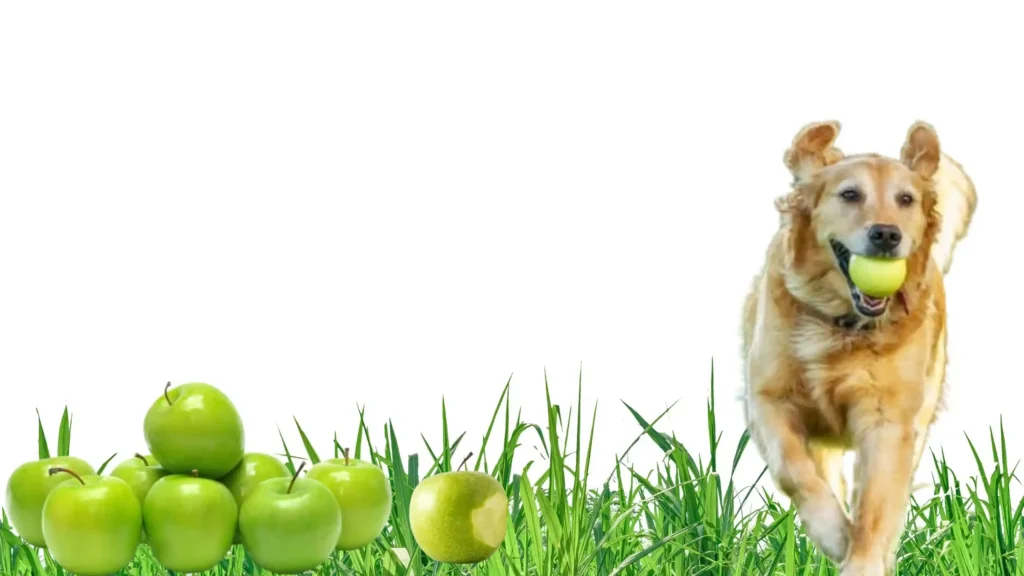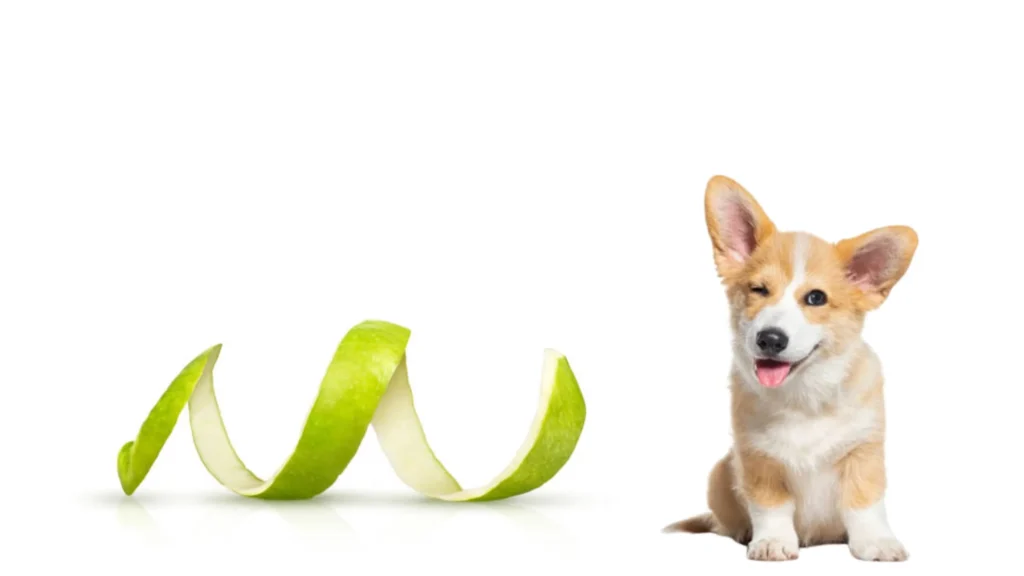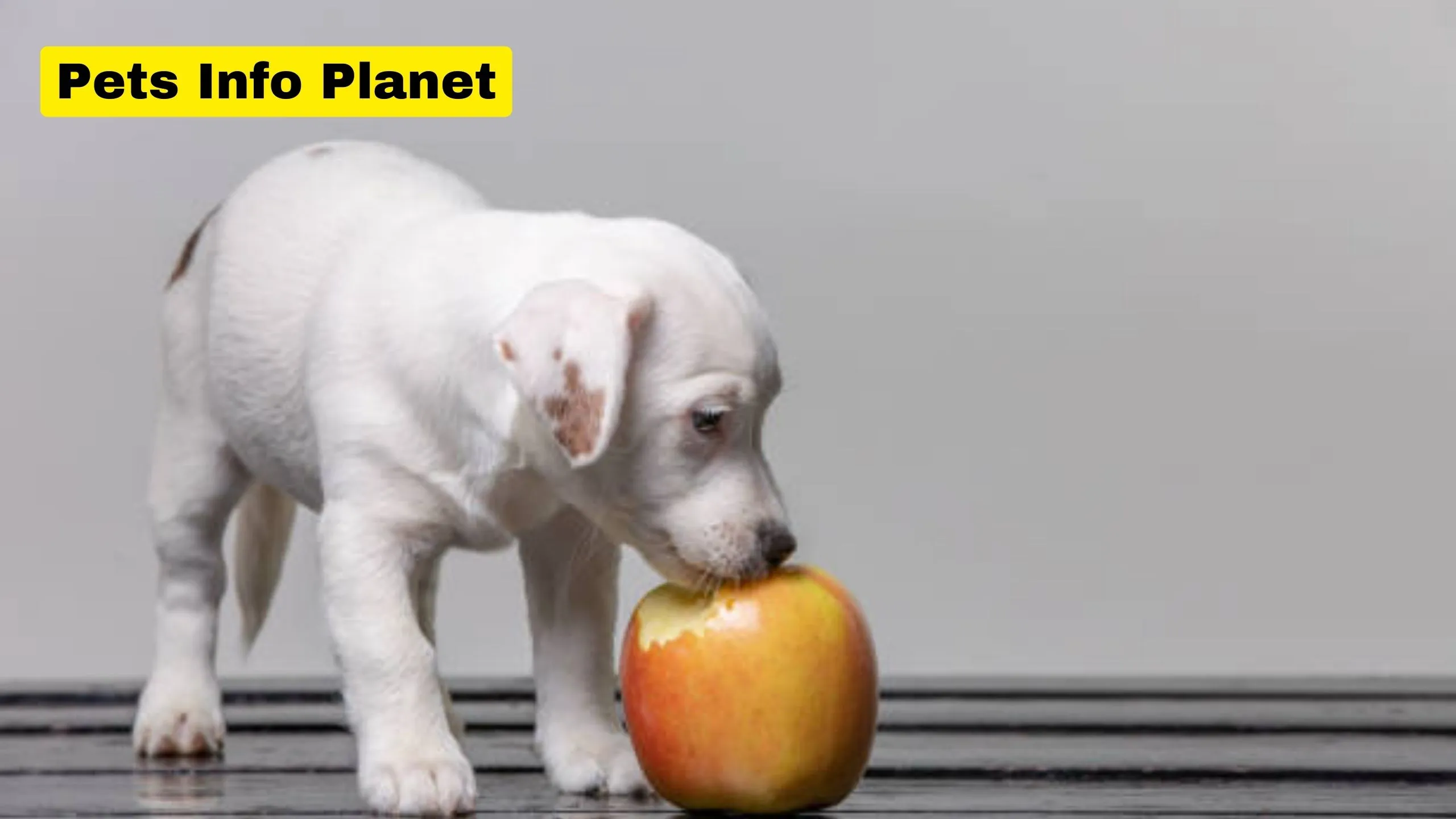Want to know if your furry “can dogs eat apples”. This is a common question among dog owners who want to make sure their pets enjoy a healthy and balanced diet. Apples are a popular snack for humans, but are they safe and beneficial for our canine companions? Let’s dive into the juicy details of whether dogs can eat this crunchy and nutritious fruit without any problems.
Can Dogs Eat Apples?
If you’ve ever enjoyed an apple’s crisp and juicy bite, you might wonder if your furry friend can share this delightful experience. The good news is that apples can be a safe and healthy dog treat when given in moderation.
Apples are packed with essential nutrients such as vitamins A and C, dietary fiber, and antioxidants, which can contribute to your dog’s overall well-being. The fiber content in apples can aid digestion and promote a healthy digestive system for your canine companion. Additionally, the natural sweetness of apples can make them a tasty alternative to processed dog treats.
However, there are a few precautions to remember when offering apples to your dog. Firstly, permanently remove the seeds and core, as they contain small amounts of cyanide, which can harm dogs if consumed in large quantities. Cutting the apple into bite-sized pieces is also essential to prevent choking hazards.
Furthermore, while apples are generally safe for dogs, some individuals may have sensitivities or allergies to certain fruits. Introducing new food gradually and monitoring your dog for adverse reactions is crucial.
Are Apples Good for Dogs?
Yes, apples can be a nutritious addition to a dog’s diet. Apples are packed with vitamins and fiber, offering several health benefits for our canine companions. The high fiber content promotes a healthy digestive system and can help regulate bowel movements. Additionally, apples contain antioxidants that can support the immune system and protect against cellular damage.
However, removing the seeds and core is essential, as they can be harmful. Also, moderation is vital, as too much fruit can cause digestive upset. Apples can be a healthy and tasty dog treat when given in appropriate portions and prepared correctly.
Apple Nutritional Benefits For Dogs
Apples aren’t just a tasty delight for humans; they also offer numerous nutritional benefits for our canine companions. Packed with essential vitamins like A and C, apples contribute to your dog’s immune system, promoting overall health. The natural sweetness of apples makes them a wholesome alternative to store-bought treats, reducing the intake of artificial additives.
High in Fiber:
Apples are a great source of dietary fiber for dogs. Fiber aids digestion promotes bowel regularity, and can help manage weight by providing a feeling of fullness. It also supports a healthy gastrointestinal tract and can alleviate constipation or diarrhea. Including apples in your dog’s diet can contribute to a healthy digestive system and overall gastrointestinal health.
Rich in Vitamins:
Apples are packed with essential vitamins, including vitamins A and C. Vitamin A promotes good vision and a healthy immune system. In contrast, vitamin C is an antioxidant, supporting immune function and protecting against cellular damage. These vitamins are crucial in maintaining your dog’s overall health and well-being.
Low in Fat and Calories:
With their low fat and calorie content, apples make a healthy snack option for dogs. They can be used as a low-calorie treat or as a substitute for high-calorie processed treats, helping to maintain a healthy weight and prevent obesity-related issues. Feeding apples as part of a balanced diet can contribute to weight management and control excessive calorie intake.
Natural Teeth Cleaner:
The crunchy texture of apples can help clean a dog’s teeth by removing plaque and promoting good oral health. Chewing on apples can help reduce tartar buildup and freshen your breath. However, it’s important to note that apples should not replace regular dental care, such as brushing your dog’s teeth or professional dental cleanings.
Hydration and Freshness:
Apples have a high water content, which can contribute to a dog’s hydration. Staying adequately hydrated is essential for overall health and organ function. Additionally, their natural sweetness can provide a refreshing and flavorful addition to a dog’s diet, making them a tasty and hydrating treat option.
Remove the seeds and core before offering apples to your dog, as they can be a choking hazard and contain small amounts of cyanide. Moderation is also crucial, as excessive consumption can lead to digestive upset. As with any dietary changes, it’s recommended to consult with your veterinarian before introducing apples or any new food to your dog’s diet.
How Much Apple Can A Dog Eat?

The amount of apples a dog can safely eat depends on size and individual tolerance. As a general guideline, offering apples to dogs in moderation is recommended. A few small apple slices or cubes can be sufficient for small dogs.
Medium-sized dogs can typically consume a half to a whole apple, while larger breeds may be able to handle an entire apple or slightly more. Cut the apple into bite-sized pieces and remove the seeds and core, as they can be harmful. Monitoring your dog’s response and consulting with a veterinarian can help determine the appropriate amount of apple for your furry friend.
What Age Can Puppies Eat Apples?
Puppies can start eating apples once they are around six months old. Their digestive system is more developed at this age, and they can better tolerate new foods. Introducing apples in small, bite-sized pieces is vital to prevent choking. Apples are a healthy treat for puppies, providing essential vitamins and nutrients. However, the seeds and core should be removed as they contain cyanide, which can be harmful. Constantly monitor your puppy’s reaction to new foods and consult your veterinarian if you are concerned about introducing apples or other fruits into their diet.
Age Range |
Dietary Recommendations for Puppies |
| 0-4 months | Focus on mother’s milk or high-quality puppy milk |
| 4-6 months | Introduction of puppy food in small portions |
| 6-12 months | Gradual transition to regular puppy diet |
| 12+ months | Full adoption of a balanced adult dog diet |
How to Safely Feed Apples to Dogs
To safely feed apples to dogs, follow these guidelines:
- Opt for organic apples whenever possible to minimize exposure to pesticides. Ensure the apples are ripe and free from bruises or mold.
- Before offering apples to your dog, remove the seeds and core. Apple seeds contain small amounts of cyanide, which can be harmful if ingested in large quantities.
- Slice the apple into small, bite-sized pieces to prevent choking and make it easier for your dog to eat and digest. Ensure the details are appropriate for your dog’s size and chewing ability.
- Start with a small amount when introducing apples to see how your dog reacts. Monitor for any signs of allergies or digestive issues.
- While apples are generally safe for dogs, they should be given in moderation. Treat them as occasional snacks or treats and avoid excessive consumption, as it can lead to digestive upset.
- If your dog has any existing health conditions or is on a specific diet, consult your veterinarian to determine if apples are suitable and how they fit into your dog’s overall nutrition plan.
Remember, every dog is unique, and monitoring their response to apples is important. If you notice any adverse reactions, discontinue feeding apples and consult with a veterinarian for further guidance.
Read More: Can Dogs Eat Strawberries? Comprehensive Guide In 2024
What Happens If My Dog Ate An Apple Core?
If your dog has eaten an apple core, monitoring them for any signs of discomfort or illness is essential. While a small amount of apple core is unlikely to cause significant harm, there are a few potential risks to be aware of:
Choking Hazard:
Apple cores can be challenging to digest and may pose a choking hazard, especially if swallowed whole or in large pieces. Monitor your dog closely for signs of distress, such as excessive drooling, coughing, or difficulty breathing.
Cyanide Content:
Apple seeds contain small amounts of cyanide, which can be toxic if consumed in large quantities. However, a single apple core is unlikely to have a dangerous amount of cyanide. Nevertheless, it’s still a good idea to observe your dog for any symptoms of cyanide poisoning, such as vomiting, diarrhea, rapid breathing, or weakness.
If you are concerned about your dog’s health or if they show any concerning symptoms after consuming an apple core, it’s best to contact your veterinarian for guidance. They can provide specific advice based on your dog’s size, weight, and overall health. Sometimes, they recommend monitoring the situation at home or bringing your dog in for an examination.
Can Dogs Eat Apples Seeds?
Apple seeds contain a small amount of amygdalin, which can release cyanide when metabolized. While the amount of cyanide in apple seeds is generally considered low and unlikely to cause harm in small quantities, it is still best to avoid feeding apple seeds to dogs.

Consuming a few apple seeds is unlikely to be toxic to a dog, especially in the context of a whole apple. However, removing the seeds before giving your dog an apple or other fruit is always a good idea. This precaution helps prevent any potential risk.
If your dog accidentally eats a few apple seeds, it is unlikely to cause significant harm. However, suppose your dog ingests many apple seeds or shows signs of discomfort, such as vomiting, diarrhea, or difficulty breathing. In that case, it is recommended that you contact your veterinarian for guidance.
Can Dogs Eat Apples With Skin?
Yes, dogs can eat apples with the skin. Apple skin is generally safe for dogs and contains additional fiber and nutrients. It’s essential to thoroughly wash the apple to remove any potential pesticides or contaminants before offering it to your dog. The apple’s skin can provide additional chewing satisfaction and promote dental health by helping remove plaque.

However, some dogs may have difficulty digesting apple skin or may be sensitive to it. If you notice any digestive upset or allergic reactions after your dog consumes apple skin, it may be best to remove the skin before feeding them apples. As always, it’s recommended to consult with your veterinarian to ensure that apples with skin are suitable for your dog’s specific dietary needs.
Related: 10 Best Dog Breeds For Families With Kids
Conclusion
In conclusion, “Can Dogs Eat Apples?” receives a resounding yes, celebrating the delightful and nutritious potential these fruits bring to our furry friends’ diets. Apples, rich in vitamins, fiber, and antioxidants, contribute to overall canine well-being when served in moderation. However, caution is paramount—eliminate seeds and cores to avoid cyanide exposure.
Sliced apples and sans seeds offer a hydrating and crunchy treat. Before introducing any new food, consulting a veterinarian ensures alignment with specific dietary needs. Apples, with their myriad benefits, can be a wholesome addition when approached responsibly. So, let your canine companions enjoy the crisp joy of apples tailored to their unique needs and health conditions.

